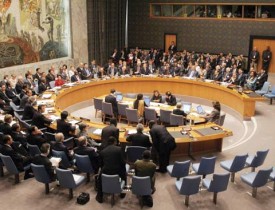In an exclusive interview with Pajhwok Afghan News, Mahmoud Saikal said: “After the UNSC delegation’s visit to Afghanistan, we anticipate greater cooperation from and larger consensus among the members.”
The council, he said, received a strong mandate from the Afghan government and people to address the issue of terrorist safe havens in Pakistan. At a subsequent UNSC meeting, the US said made clear status quo on the issue was unacceptable.
The question of terrorist safe havens in the neighbouring country was the most important problem, the diplomat stressed, hoping the Security Council would take positive action to resolve it.
“We believe the safe havens could be addressed within the sanctions regime. The UN sanctions regime as far on paper looks comprehensive, conclusive and talks about curbing the movement financing and arming of the terrorists. And of course, training and so on, as part of it,” Saikal said.
Afghanistan, he said, had been calling for improving implementation of the sanctions regime and strengthening the monitoring mechanism. “And second, not to politicise the sanctions regime,” he added.
Evidence provided by Afghanistan should be seen on its merit, not through political lens, the ambassador cautioned. “Probably one or two every now and then look at it not from a technical but from a political point.”
Without going into specifics, Saikal said Afghanistan recently presented to the sanctions committee all evidence with regard to the leader of a terrorist group. “Now a member has put that on hold. We don't know the logic of it.”
Saikal lamented Pakistan had been unsuccessfully trying to change the narrative in the past couple of years. But there are no takers for such an argument from Pakistani diplomats either at the UN or other international forums.
“Most member states know about the safe havens. They know the leading figures of terrorist groups have lived in Pakistan. They have been found dead in Pakistan. They have been killed and buried in Pakistan,” he continued.
“Osama bin Laden was found and killed in Pakistan. Mullah Omar died in a Karachi hospital. Mullah Akhtar was killed in Balochistan. And right now, leading figures of the Taliban are in Pakistan. This is public knowledge,” he alleged, saying Pakistan’s efforts to change the narrative did not help.
“I think the time has come that we accept there is something wrong. It’s something which is hurting Pakistan itself. It's hurting our region. And it is the job of all of us to work together to address it.
“Our intention is to see Pakistan as a trusted partner in countering terrorism, a good neighbour that believes in coexistence and feels responsible for its own security, security and safety of neighbours and the region at large,” he concluded. mud







